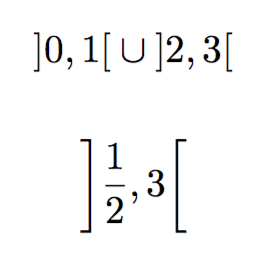\begin{align} \forall x\in(0,+\infty), \quad f(x) > 0 \tag 1 \\[10pt] \forall x\in ]0,+\infty[, \quad f(x) > 0 \tag 2 \\[10pt] \forall x\in {]}0,+\infty{[}, \quad f(x) > 0 \tag 3 \end{align} I was instructed from an early age to use the notation in line $(1)$ above. In France apparently the one in line $(3)$ prevails, or at least has some currency. I coded line $(3)$ like this:
\forall x\in {]}0,+\infty{[}, \quad f(x) > 0
Line $(2)$, on the other hand, is coded like this:
\forall x\in ]0,+\infty[, \quad f(x) > 0
In the conspicuous difference between the appearances of lines $(2)$ and $(3)$ we see that MathJax doesn't apply the spacing conventions that it applies well in line $(1)$. (Apparently to some users this is not conspicuous until the actual juxtaposition of lines $(2)$ and $(3)$ is seen.)
If one must use the French notation, how should that be done? Just the way I did in line $(3)$? Or is there a less crude way?


\left]and\right[to see if that improves the spacing. $\endgroup$